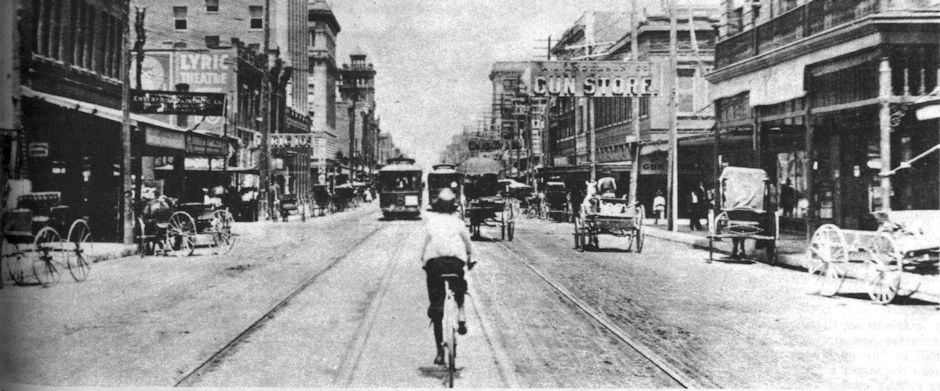It’s Election Day! Election Day in America is the first Tuesday after the first Monday in November. In 1908 that Tuesday was November 3. The presidential election was a double-Bill contest: William Howard Taft versus William Jennings Bryan.
William Howard Taft (photo from Wikipedia).
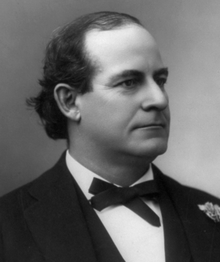
William Jennings Bryan (photo from Wikipedia).
One man in Fort Worth had a special interest in the outcome of that election 112 years ago.
Carl Schilder was a minor character in Fort Worth history, seldom in the headlines, unmentioned in most history books. But like many others, he was a small business owner, active in local politics, well liked. And he made Fort Worth a more colorful place at the turn of the twentieth century.
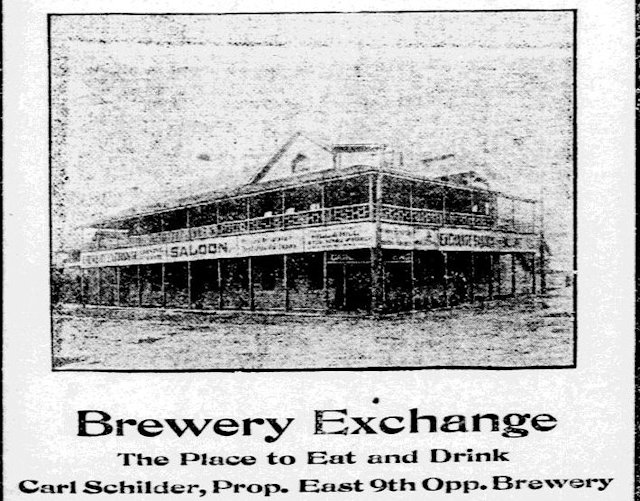 Schilder was born in Austria in 1865 and by 1896 was living in Fort Worth. He operated saloons, including the Brewery Exchange, which was a saloon, boardinghouse, and billiards hall at the corner of East 9th and Grove streets opposite the Texas Brewing Company.
Schilder was born in Austria in 1865 and by 1896 was living in Fort Worth. He operated saloons, including the Brewery Exchange, which was a saloon, boardinghouse, and billiards hall at the corner of East 9th and Grove streets opposite the Texas Brewing Company.
Carl was the brother of Adoph Schilder, who also operated a saloon and owned a neighborhood grocery store on East Leuda Street next to the home of ex-slave Hattie Cole.
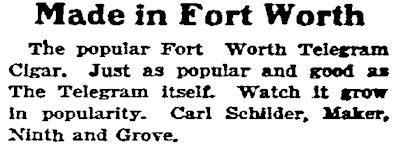
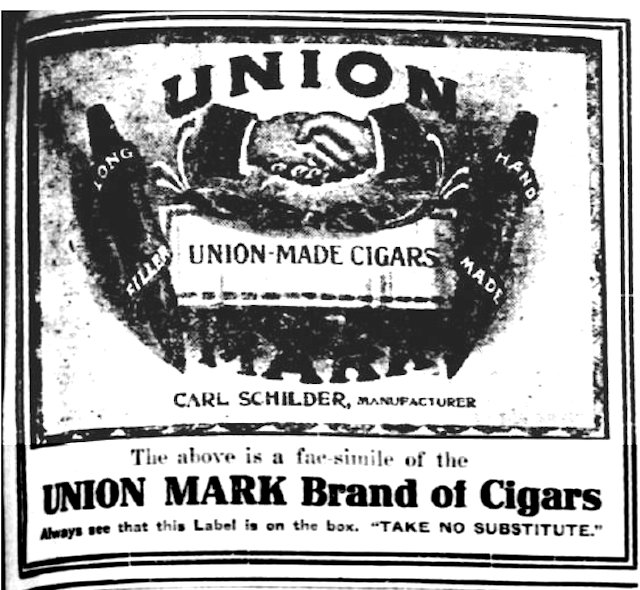 Carl Schilder also made and sold cigars, including a cigar named after the local newspaper. (The Telegram became the Star-Telegram in 1909.)
Carl Schilder also made and sold cigars, including a cigar named after the local newspaper. (The Telegram became the Star-Telegram in 1909.)
Schilder was active in Fort Worth’s German community. In particular he was secretary of Sons of Hermann.
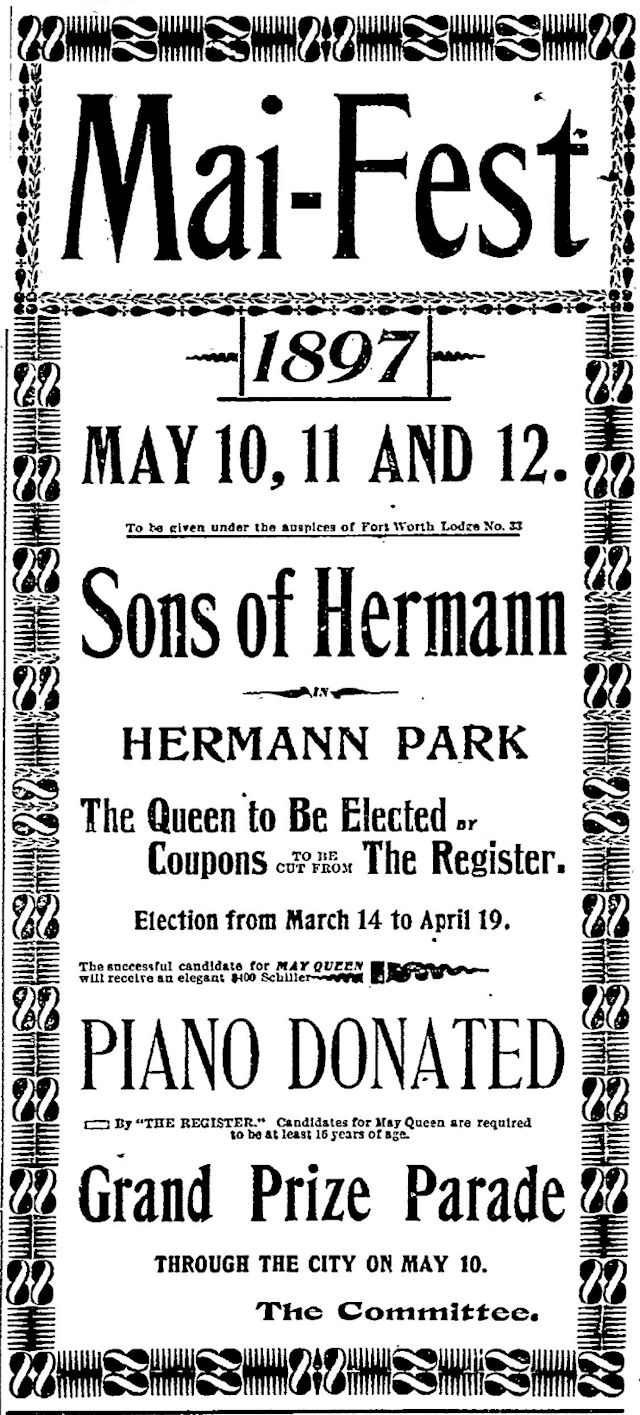 Sons of Hermann hosted Maifest at Hermann Park.
Sons of Hermann hosted Maifest at Hermann Park.
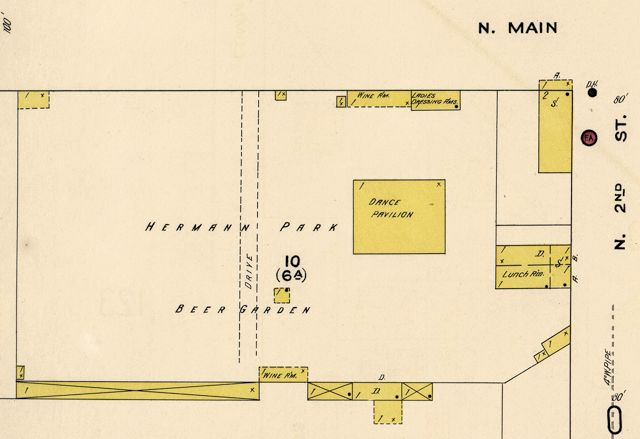 Hermann Park, with a beer garden and pavilion, was located on North Main at North 2nd Street.
Hermann Park, with a beer garden and pavilion, was located on North Main at North 2nd Street.
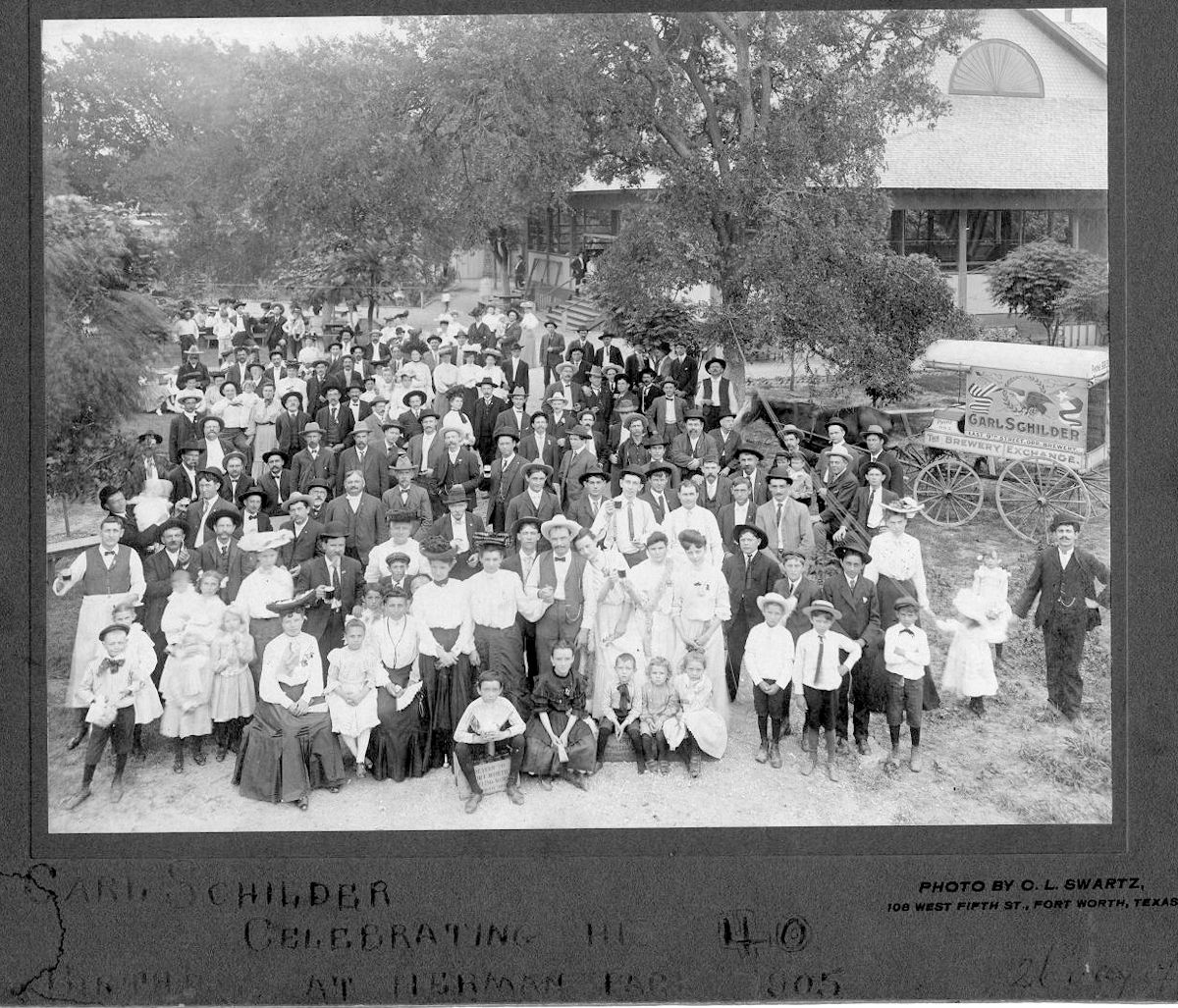 The ubiquitous chronicler Charles Swartz took this photograph of Carl Schilder’s fortieth birthday celebration at Hermann Park in 1905. I think Schilder is the man in the center of the second row, wearing a light hat, dark bow tie, vest, watch chain, and mustache. He probably is flanked by his wife Dora and daughters. Some of the women are holding hand fans. The small wagon bears an ad for Schilder’s Brewery Exchange saloon. (Photo from University of Texas at Arlington Library.)
The ubiquitous chronicler Charles Swartz took this photograph of Carl Schilder’s fortieth birthday celebration at Hermann Park in 1905. I think Schilder is the man in the center of the second row, wearing a light hat, dark bow tie, vest, watch chain, and mustache. He probably is flanked by his wife Dora and daughters. Some of the women are holding hand fans. The small wagon bears an ad for Schilder’s Brewery Exchange saloon. (Photo from University of Texas at Arlington Library.)
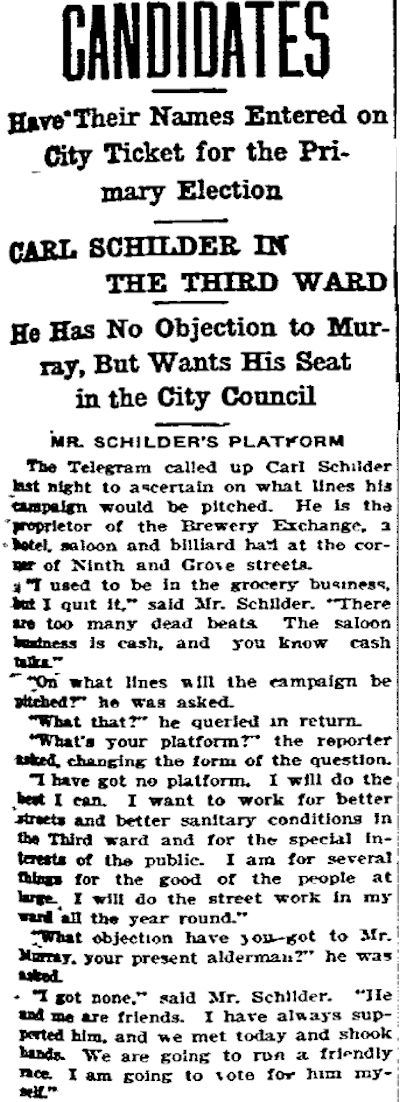 Schilder also was active in the Democratic Party in the Third Ward (which included Hell’s Half Acre). He served on the city committee of the Democratic Party and early in 1904 was a candidate in the Democratic primary for alderman from the Third Ward. Late in 1903 the Telegram had interviewed candidate Schilder and asked him what his platform was.
Schilder also was active in the Democratic Party in the Third Ward (which included Hell’s Half Acre). He served on the city committee of the Democratic Party and early in 1904 was a candidate in the Democratic primary for alderman from the Third Ward. Late in 1903 the Telegram had interviewed candidate Schilder and asked him what his platform was.
Schilder said he had no platform.
The Telegram asked Schilder what he had against his opponent in the primary, incumbent alderman Murray.
Schilder said he had nothing against Murray. “He and me are friends. I have always supported him, and we met today and shook hands. We are going to run a friendly race. I am going to vote for him myself.”
That grand gesture of nonpartisanship aside, Schilder lost the race.
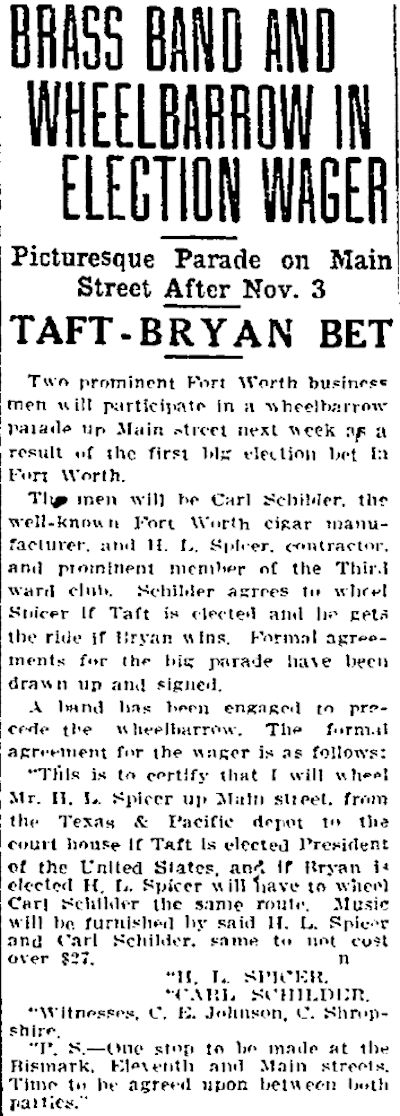 Fast-forward to 1908. In October Schilder bet contractor Harry L. Spicer that William Jennings Bryan would beat William Howard Taft in the presidential election on November 3. The loser of the bet would haul the winner down Main Street from the Texas & Pacific depot to the courthouse in a wheelbarrow—a distance of about one mile. A brass band (at a cost not to exceed $27) would precede the wheelbarrow. Note that the two bettors agreed to make one pitstop along the wheelbarrow route—at Schilder’s Bismark saloon.
Fast-forward to 1908. In October Schilder bet contractor Harry L. Spicer that William Jennings Bryan would beat William Howard Taft in the presidential election on November 3. The loser of the bet would haul the winner down Main Street from the Texas & Pacific depot to the courthouse in a wheelbarrow—a distance of about one mile. A brass band (at a cost not to exceed $27) would precede the wheelbarrow. Note that the two bettors agreed to make one pitstop along the wheelbarrow route—at Schilder’s Bismark saloon.
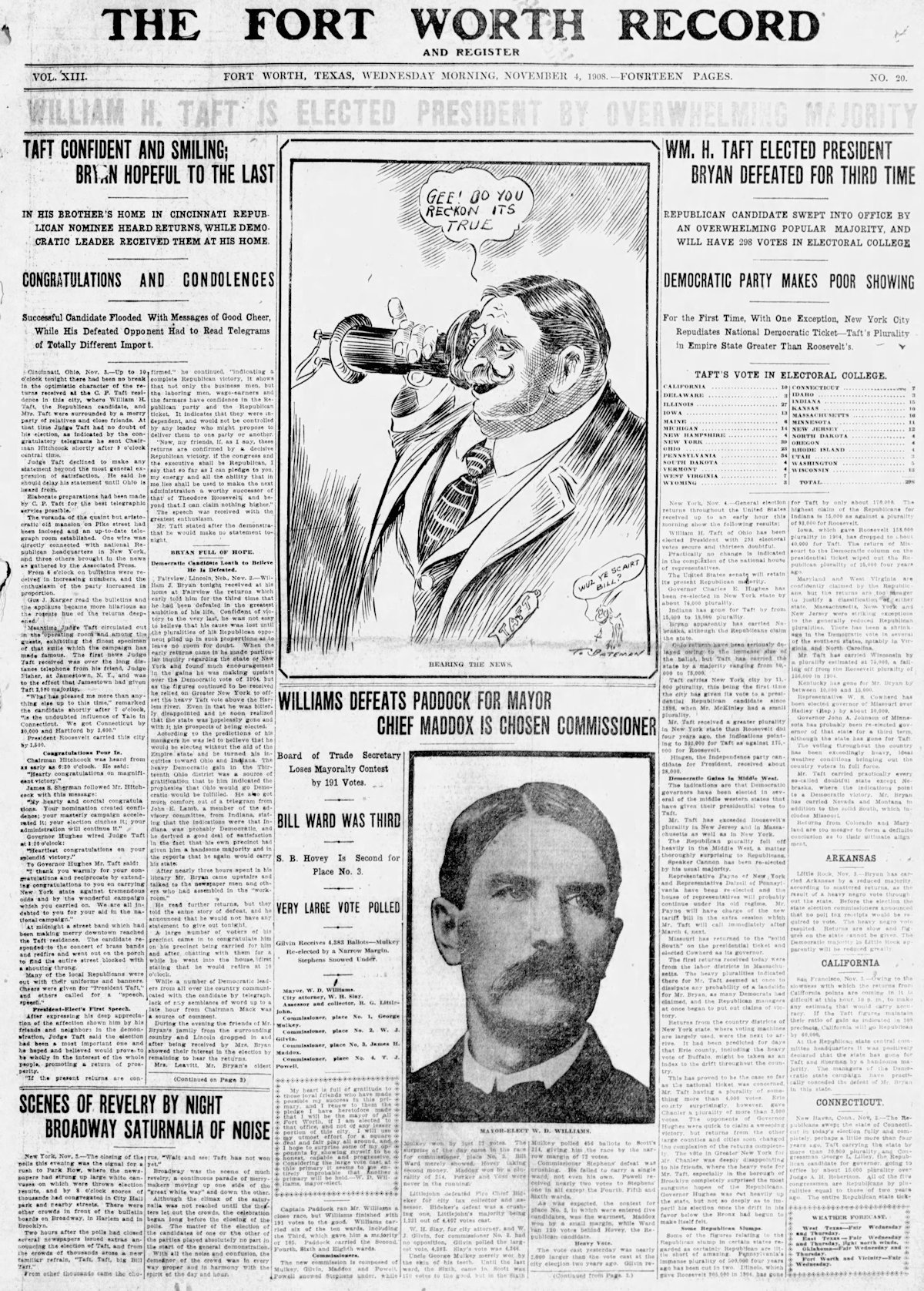 Come November 3, in an election in which 14,889,239 Americans (all of them male) voted, William Jennings Bryan and Carl Schilder lost. (In 1908 a candidate needed 242 electoral votes [now 270] to win. Texas had 18 electoral votes [now 38], which went to Democrat Bryan.)
Come November 3, in an election in which 14,889,239 Americans (all of them male) voted, William Jennings Bryan and Carl Schilder lost. (In 1908 a candidate needed 242 electoral votes [now 270] to win. Texas had 18 electoral votes [now 38], which went to Democrat Bryan.)
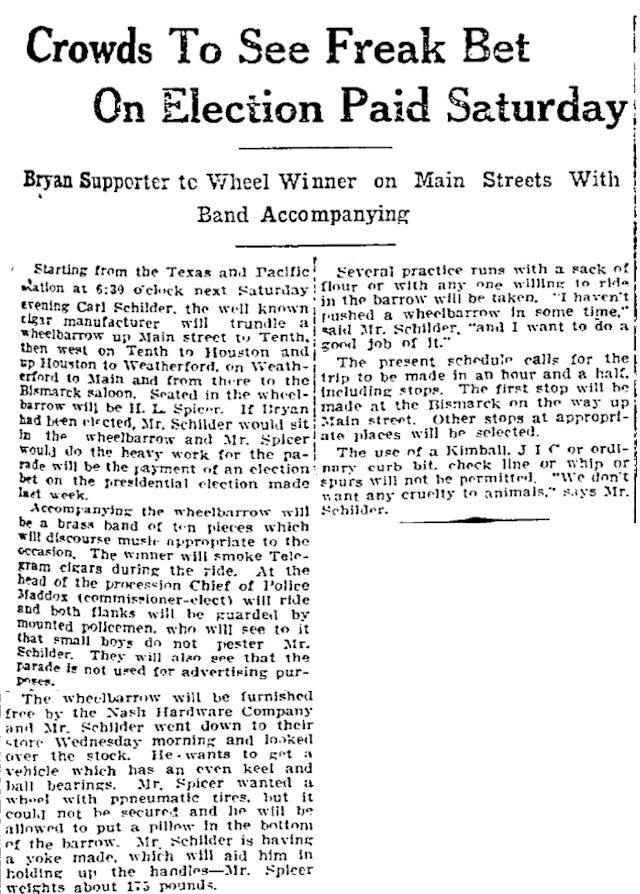
Schilder would haul Taft backer Spicer up Main Street in a wheelbarrow provided by Charles E. Nash’s hardware store while Spicer, sitting on a pillow, smoked one of Schilder’s Telegram cigars accompanied by a brass band. Police Chief James Maddox said mounted police officers would make sure that beast of burden Schilder was not pestered by small boys.
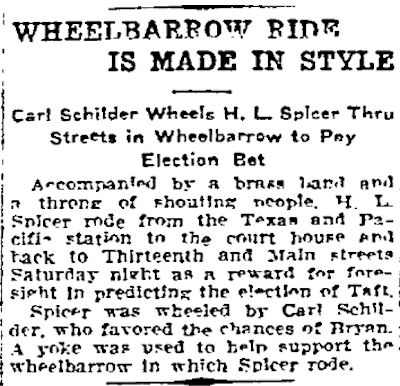 On November 7 Carl Schilder paid off his debt.
On November 7 Carl Schilder paid off his debt.
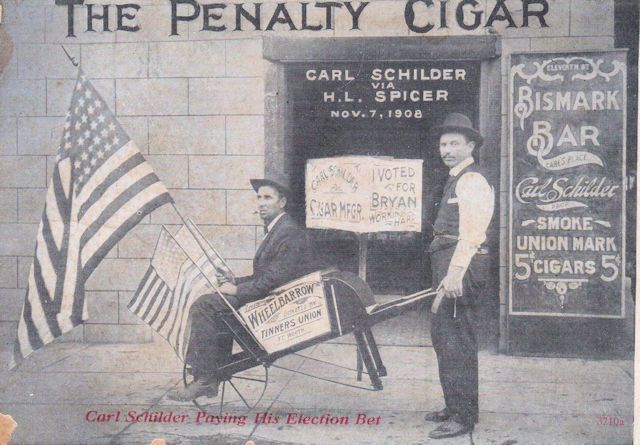 Postcard from Barbara Love Logan.
Postcard from Barbara Love Logan.
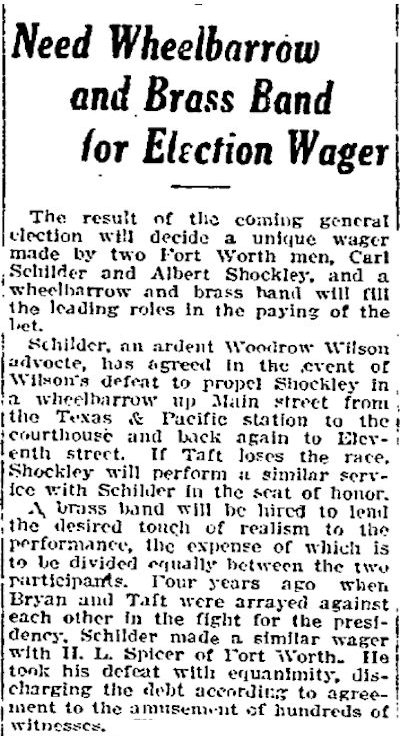 Fast-forward four years. Another presidential election. Another bet by Carl Schilder. This time he was backing Woodrow Wilson, and Albert Shockley, another local saloon owner, was backing incumbent William Howard Taft.
Fast-forward four years. Another presidential election. Another bet by Carl Schilder. This time he was backing Woodrow Wilson, and Albert Shockley, another local saloon owner, was backing incumbent William Howard Taft.
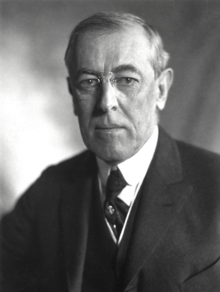 Woodrow Wilson (photo from Wikipedia).
Woodrow Wilson (photo from Wikipedia).
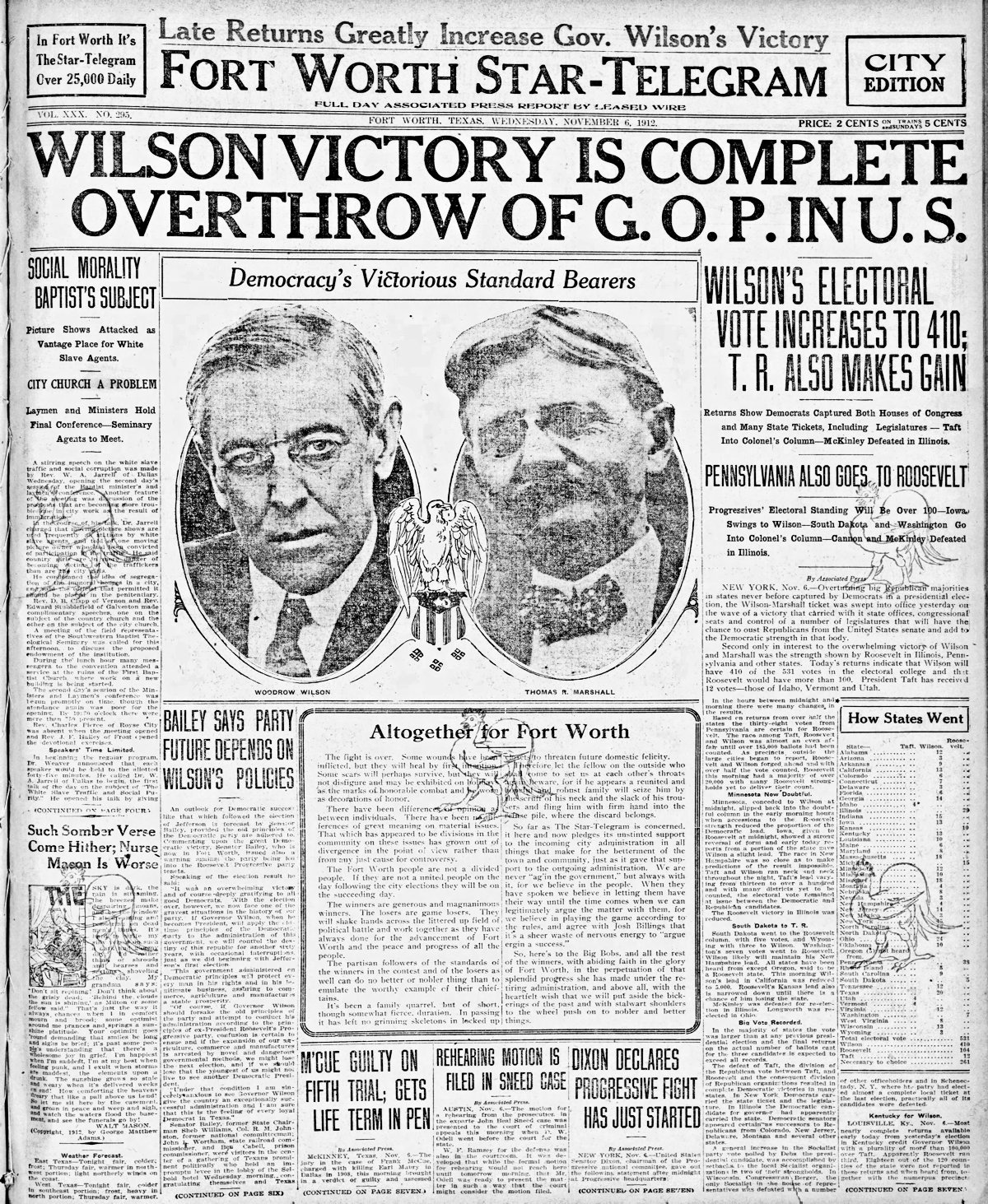 Come November 5, 1912, in an election in which 15,048,834 Americans (again, all of them male) voted, Woodrow Wilson won. (In 1912 261 electoral votes were needed to win. Texas had 20 electoral votes, which went to Democrat Wilson.)
Come November 5, 1912, in an election in which 15,048,834 Americans (again, all of them male) voted, Woodrow Wilson won. (In 1912 261 electoral votes were needed to win. Texas had 20 electoral votes, which went to Democrat Wilson.)

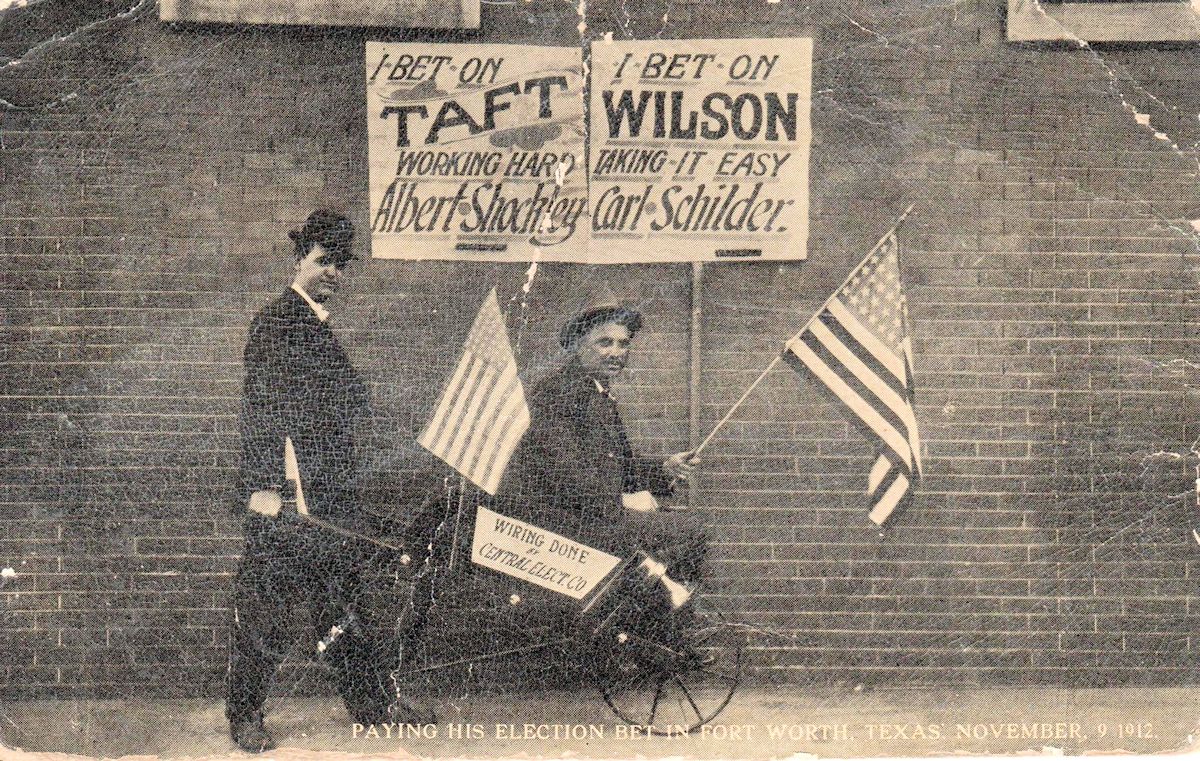
Come November 9 this time Carl Schilder was “taking it easy” while Albert Shockley was “working hard” behind the wheelbarrow. (Postcard from Barbara Love Logan.)
Come 1916, did Carl Schilder have another bet in mind for the November 7 presidential election, perhaps again betting a barrow ride on incumbent Woodrow Wilson against opponent Charles Evan Hughes?
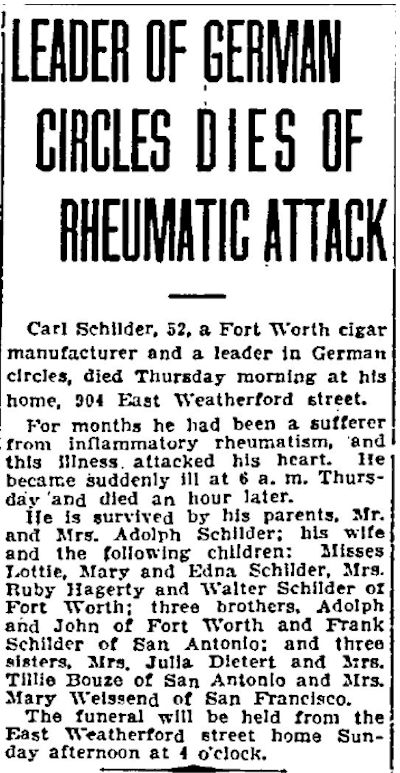 Alas, we’ll never know. Carl Schilder died in July of that year.
Alas, we’ll never know. Carl Schilder died in July of that year.
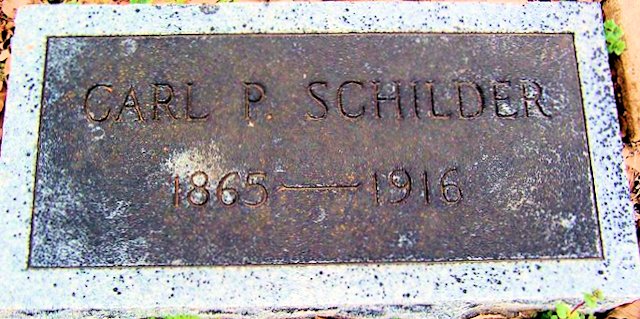 Carl Schilder, who brought friendly rivalry to elections in a simpler time, is buried in Oakwood Cemetery.
Carl Schilder, who brought friendly rivalry to elections in a simpler time, is buried in Oakwood Cemetery.
Footnote: Four years after Carl died, his widow Dora finally got her turn. With ratification of the Nineteenth Amendment (introduced in 1878) in 1920 millions of women, including Dora, were granted the right to vote. Because Dora lived until February 20, 1945, it’s possible that she voted in seven presidential elections.
